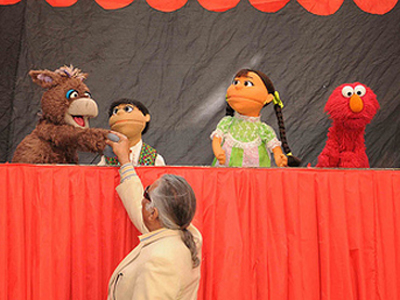The Perils of Nation Rebuilding: Sesame Street and the Corruption of Pakistan
When an innocent children's show ends up being pilfered for dollars, it's time to rethink Washington's aid plan.
 Characters from Sim Sim Hamara, the Pakistani version of Sesame Street.To grasp just how toxic and corrupt and venal America's relationship with Pakistan has become it is not necessary to focus on drone strikes or military or farm aid. Instead, the revelation that the U.S. Agency for Aid and Development has now shut down a $20 million program to bring the children's television show Sesame Street to Pakistan serves as perhaps the most telling sign of the moral rot that suffuses our alleged ally in the war on terror. The show was called Sim Sim Hamara. It was supposed to do all the good things that Washington wants to inculcate abroad—preach tolerance and diversity and educate youngsters, who would learn along the way that America is not the Great Satan.
Characters from Sim Sim Hamara, the Pakistani version of Sesame Street.To grasp just how toxic and corrupt and venal America's relationship with Pakistan has become it is not necessary to focus on drone strikes or military or farm aid. Instead, the revelation that the U.S. Agency for Aid and Development has now shut down a $20 million program to bring the children's television show Sesame Street to Pakistan serves as perhaps the most telling sign of the moral rot that suffuses our alleged ally in the war on terror. The show was called Sim Sim Hamara. It was supposed to do all the good things that Washington wants to inculcate abroad—preach tolerance and diversity and educate youngsters, who would learn along the way that America is not the Great Satan.
But it appears this is another exercise in what might be called nation rebuilding that has gone awry. An outfit in Lahore called the Rafi Peer Theater Workshop has allegedly been acting like a Miss Piggy rather than an upstanding Elmo. It should be enough to make even proponents of foreign aid feel as grouchy as Oscar. The group apparently has been misusing State Department funds—about $7 million so far—that have been sent to it. USAID's Mark Toner explained that
We did receive via that hotline what we believe were credible allegations of fraud and abuse by the Rafi Peer Theater Workshop. So we did launch an investigation into the allegations. We've also sent the theater workshop a letter that terminates the project agreement.
What has the workshop, which denies the accusation, doing? Shortchanging the costumes of the characters to skim off some of the money? Stiffing the set designers?
More seriously, the question for Congress, which is scrutinizing futher aid to Pakistan, has to be what kind of oversight is being exercised over the hundreds of millions that are disbursed each year to Pakistan. The answer is probably not very much. The relationship with Pakistan is more that of an extortionist than a grateful recipient, which is why Islamabad is currently attempting to blackmail Washington into paying top dollar for port and highway access into Afghanistan to resupply soldiers. Fortunately, the Obama administration does not seem to be acceding to Pakistan's cupidity, at least when it comes to these latest demands.
But the Romney campaign surely has an opening with which to question the entire American relationship with Pakistan, and its questioning should start with the matter of Sesame Street. USAID administrator Dr. Rajiv Shah has been extremely active in Pakistan—even a cursory look at his organization's website suggests the breadth of its activities, which run into the billions of dollars in the past two years alone. But as Shah himself noted, Pakistan is a financial cesspool. In a speech this past April, Shah said, "By most accounts, fewer than 2 percent of the population pays taxes-and the wealthiest often pay the least. So long as this remains true, Pakistan simply won't have the resources it needs to prosper."
Yet the Christian Science Monitor is complaining that "If Sim Sim Hamara goes off the air, but US bombs keep dropping, another generation of Pakistanis will have only one thing to associate the US government with: war." Please. Such handwringing amounts to blaming the victim. There's no cogent reason for America to fund corruption. And if even an innocent children's show ends up being pilfered for dollars, how can Washington have any confidence that its more substantial aid programs are being implemented effectively?
Image: U.S. Embassy Pakistan
